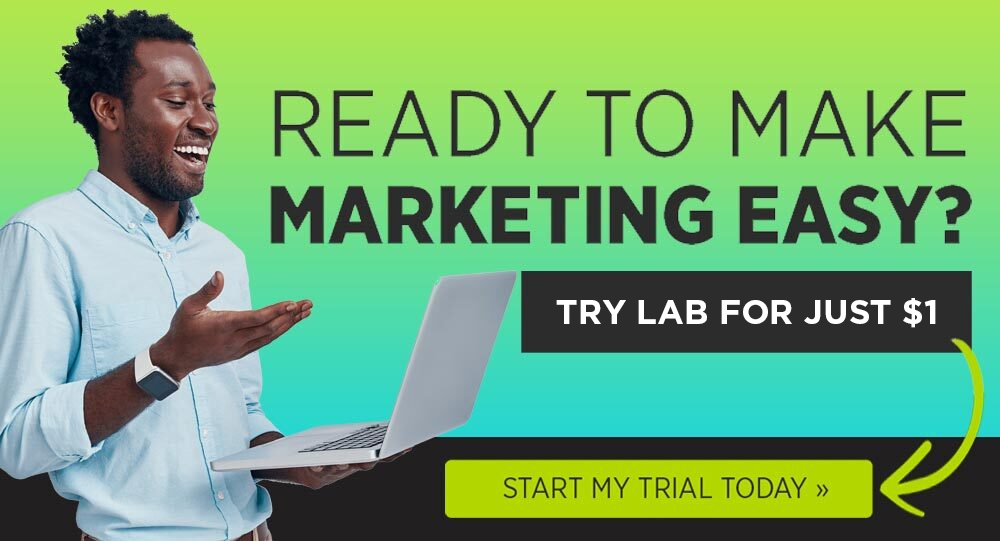Personalized marketing is creating a specific experience for individual users. While in the past marketers have been creating specific experiences for a group of users (think of basic retargeting ads or landing page copy), the digital landscape is maturing.
Great marketing will no longer mean choosing a lookalike audience on Facebook and hoping for the best. It will mean interacting with customers in correlation to the phase of the Customer Value Journey (CVJ) they’re in.
Personalized marketing is a strategy that shows people different landing pages, ads, and emails depending on their interactions with your company.
This may sound futuristic, but trust us—the future is here. Marketers are already using these strategies and becoming masters of personalized marketing. We want you to hop on this train too… before it leaves the station.
What Are Examples of Personalized Marketing?
Custom Landing Pages
Austin Distel, CMO at Proof, has spent the past year perfecting his personalized marketing strategy . At the Traffic & Conversion Summit, he showed us exactly how his landing page personalization is working.
When a user first visits the Proof website, they’ll see this landing page:


To watch the demo (the CTA of this landing page), the website visitor first has to tell Proof what kind of business they run or work for.


Cue the personalization. Knowing where the visitor works is all of the information Proof needs to personalize the copy on their next landing page experience. Let’s say that the visitor chose the “SaaS” option. When they revisit Proof’s landing page, they’re going to have an entirely different experience.
They’re going to see this one:


Can you see the difference?
Proof has personalized the header, “See why the fastest growing SaaS companies use Proof to acquire more users.” If the visitor had chosen an ecommerce business, then their next website visit would show them this page:


Notice the changing header: “See why the fastest growing E-commerce companies use Proof to increase product sales and average order value.”
What happens when an ecommerce owner or a marketer of an ecommerce business sees their business and their specific pain points on the landing page? They see that Proof knows exactly what they need, not what every business needs.
Retargeted Shopping Cart Ads
We’re seeing the same in the ecommerce space.
Companies can use retargeting ads to show Facebook and Instagram users the items they left in their cart on a previous website’s page.
Mega clothing company Revolve (whose IPO hit a market cap of $1.47 billion) is no stranger to social media marketing. They jumped on social media ads before the majority of clothing brands and now, they’re jumping on the next trend of personalized marketing.
Less than 24 hours after strategically abandoning items in a cart on Revolve’s website, they showed us the same items in a sponsored carousel post on Instagram.
Here’s the Revolve cart:


And here is the Instagram post:


Why Personalized Marketing Matters
From a consumer’s perspective, we can see why having a SaaS company speak directly to our needs or an ecommerce company remind us about items we wanted to buy is useful. It automates part of the buying process and helps us make our decision (do we want it or not?).
In his book Marketing to Mindstates, Founder and CEO of Trigger-Point Will Leach, breaks down the 4 factors that drive buying decisions:
- Location: Is your customer in a place where they can buy your product?
- For example, if they’re driving, they probably can’t purchase it right now
- People: Is there a customer around them that can sway their motivation to buy?
- For example, are they around other business owners who just signed up for Proof?
- Feelings: What mood is the customer in right now as they are reading your website, ad, email, etc.?
- For example, did they just find out how much they owe the IRS in taxes and are feeling really tight on money?
- Framing: Does your message frame their problem and the solution you’re going to give them?
- For example, Proof frames its solutions based on the type of business a marketer needs.
Framing is the only factor a marketer can control. There’s no way to control your customer’s location, the people they are around, or the feelings they are having 100% of the time, but you can control how you frame the message, thanks to personalized marketing.
With personalized marketing, you can very specifically control how that message is framed. This means that you’re not framing for groups, the way that most marketing is done today, but instead for an individual.
And consumers are open to it.
- 91% of consumers are more likely to shop with brands giving relevant offers and recommendations
- 36% of consumers believe brands should be giving a more personalized marketing experience
- Personalization has led to:
- 55% increase in visitor engagement
- 55% increase in customer experience
- 39% improvement in brand perception
- 51% increase in conversion rates
- 46% increase in lead generation and customer acquisition
Takeaways…
Personalized marketing creates a different experience for users based on their past interactions with a website.
Examples of personalized marketing are user-based landing pages and retargeted ads based off of a user’s abandoned shopping cart.
Ninety-one percent of consumers say they are more likely to shop with a brand that gives them personalized offers and recommendations.









